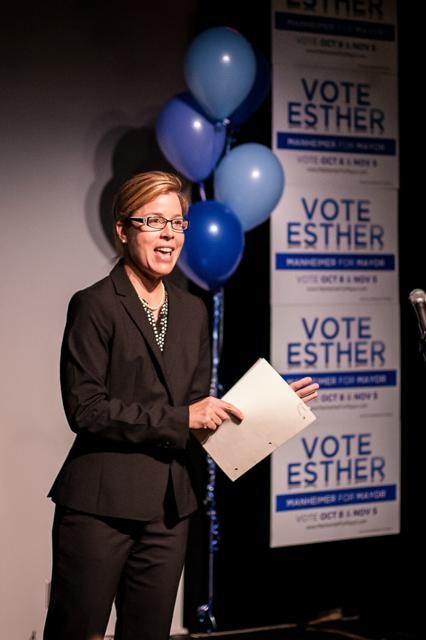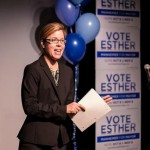- MANHEIMER’S NIGHT: New Asheville Mayor Esther Manheimer speaks to supporters after winning a landslide victory. She promised to focus on equity and the environment. Photos by Nick King
- Low turnout: A voter casts her ballot amid empty voting booths at St. Mark’s Lutheran Church. While the results were decisive, turnout was quite low.
The turnout was low, but the results of the Nov. 5 election were decisive. In an electoral landslide to become Asheville’s next mayor, Esther Manheimer buried former city Director of Risk Management John Miall. And former Coleman Co. CEO Gwen Wisler, along with incumbents Gordon Smith and Cecil Bothwell, also won convincing victories over former Asheville Police officer Mike Lanning and community activist Jonathan Wainscott (for the full voting tallies, see sidebar, “The Numbers”).
Manheimer, who’ll take over when Mayor Terry Bellamy steps down after eight years, assumes the mantle in a time of tight budgets, concerns about low wages and major conflicts with the Legislature in Raleigh.
But amid such weighty issues, why the low turnout? And what's next for the mostly unchanged City Council?
A thumbs-up for the status quo?
That's one way to interpret the electoral results, which were exactly what most media forecasters predicted.
It's easy to see why: Manheimer had a substantial lead in the Oct. 5 primary, and no major scandal or shift occurred during the ensuing month to seriously alter that dynamic. Her support proved widespread too: She won every precinct except for a handful of outlying districts with very small numbers of city voters.
The three victors in the Council race also also enjoyed other advantages: significantly greater name recognition, a head start on campaigning and much larger war chests than their opponents.
Meanwhile, both Lanning and Wainscott had found fault with Council’s spending priorities and overall management of the city, as well as Police Department controversies. Do the election results indicate that those criticisms simply didn’t resonate with most city residents?
Wisler, who supports much of the current Council agenda, seemed to interpret it that way. After her victory, she told Xpress, “The voters are saying that the city's direction is correct."
Critics, though, could point to the low turnout in casting doubt on how many Ashevilleans do, in fact, support the current Council and its policies — and some online commentators already have. Nonetheless, those voters who did turn out showed their support very clearly.
Public apathy
“Record low turnout” has become a familiar refrain in local municipal elections, and this year proved no different.
Although the precise number of ballots cast hadn’t yet been released at press time, we do know that just 19.19 percent of registered Buncombe County voters went to the polls. That number does include some voters in municipal races in smaller towns such as Black Mountain and Weaverville, but most of the ballots were from Asheville.
Still, it marks a slight decline from the 19.59 percent who voted the last time Asheville chose a mayor and three Council seats, in 2009 — when Bellamy, the incumbent, faced no serious challenge.
Even early on, there were signs of low public interest in this election. For the first time in memory, there was no Council primary — an event so rare that the Board of Elections doesn't even have a record of the last time it happened. In a city that, within the last decade, has seen as many as 15 candidates vie for three Council seats, it's a bit of a surprise that there were only five contenders.
To some extent, this could perhaps be attributed to political newcomers’ reluctance to take the reins of a city that’s facing some serious challenges — or, alternately, who fear ending up in the crosshairs of state legislators vehemently opposed to the current Council’s policies. But it's also clear that many Ashevilleans simply aren't aware of, or interested in, what goes on at City Hall.
Upcoming battles
Meanwhile, what issues will these mostly familiar Council members face?
Talking to the media after the election, Manheimer and the other victors all promised continued attention to issues like jobs and the environment. City staff is already looking at overhauling Asheville’s approach to economic development incentives to make them more accessible to small businesses as well as big names like Linamar or New Belgium Brewing. Manheimer and Wisler both called for specific targets for things like reductions in crime or the number of affordable housing units built as a way to gauge progress.
A major change in how the city handles development could also be in the works. During the campaign, Smith and Wisler advocated for more density and for an end to squabbling over specific projects. They argued for retooling city policies so that staff handle more decisions, rather than Council.
If their colleagues agree, this could mean a significantly overhauled development ordinance offering opponents of proposed projects in their neighborhood fewer opportunities to make their objections known — which would surely spark controversy.
And then there's the question of what state legislators will do upon returning to Raleigh. Although Manheimer has noted the need to work on improving relations with the General Assembly, all of the victors in this election have made it quite clear that there are certain items on which they won't budge, such as control of the city's water system.
In other words, we can definitely expect some fireworks next year, both in Asheville and in the state capital.
— David Forbes can be reached at 251-1333, ext. 137, or at dforbes@mountainx.com.






Before you comment
The comments section is here to provide a platform for civil dialogue on the issues we face together as a local community. Xpress is committed to offering this platform for all voices, but when the tone of the discussion gets nasty or strays off topic, we believe many people choose not to participate. Xpress editors are determined to moderate comments to ensure a constructive interchange is maintained. All comments judged not to be in keeping with the spirit of civil discourse will be removed and repeat violators will be banned. See here for our terms of service. Thank you for being part of this effort to promote respectful discussion.